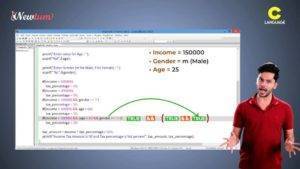Unboxing in C# is a fundamental concept that’s crucial for any coder looking to deepen their understanding of this powerful programming language. Simply put, it involves converting a value type to an object type, but there’s more to it than meets the eye. By mastering unboxing, you’ll enhance both the efficiency and the elegance of your code. Curious to know how it all works? Stick around, and we’ll delve into practical examples and real-life applications that’ll make this concept crystal clear.
What Is Unboxing in C#?
Definition of Unboxing in Technical Terms:
Unboxing is the process of extracting the value type from an object that was previously boxed. In C#, when a value type (like int, float, etc.) is assigned to an object, it is boxed. To retrieve the original value type from the object, explicit casting is required, and this operation is called unboxing.
Syntax Example:
csharpCopyEditobject obj = 10; // Boxing
int num = (int)obj; // Unboxing
✅ Difference Between Boxing and Unboxing:
| Aspect | Boxing | Unboxing |
|---|---|---|
| Direction | Value Type → Object Type | Object Type → Value Type |
| Operation | Implicit | Explicit (requires casting) |
| Memory Allocation | Allocates memory on the heap | Retrieves data from the heap |
| Example | object o = 5; | int x = (int)o; |
| Performance | Slower due to heap allocation | Slightly faster but must be safe |
Unboxing in C# Example
csharp
using System;
public class UnboxingExample
{
public static void Main(string[] args)
{
// Boxing: Converting a value type to an object type
int number = 42;
object boxedNumber = number;
// Unboxing: Converting an object type back to a value type
int unboxedNumber = (int)boxedNumber;
Console.WriteLine("Original number: " + number);
Console.WriteLine("Boxed number: " + boxedNumber);
Console.WriteLine("Unboxed number: " + unboxedNumber);
}
}
Explanation of the Code
The code snippet showcases the concepts of boxing and unboxing in C#. Let’s break it down:
- First, an integer variable ‘number’ is initialised with the value 42.Boxing then occurs, where this integer—originally a value type—gets converted into an object type. As a result, ‘number’ is now stored in ‘boxedNumber’.Next comes unboxing. Here, the object ‘boxedNumber’ is specifically converted back to an integer, resulting in the variable ‘unboxedNumber’.
Finally, the code prints out all three numbers. It’s pretty straightforward: you see the original, the boxed, and the unboxed versions. This demonstration helps illustrate how C# efficiently manages these conversions, yet it emphasizes the need for cautious type handling since mistakes can lead to runtime errors or unexpected behaviours.
Output
Original number: 42
Boxed number: 42
Unboxed number: 42
Practical Uses of Unboxing in C#
- Inventory Management at a Retail Company: A large retail chain used unboxing in C# to enhance their inventory management system. By unboxing value types, they optimised their stock database, allowing for faster data retrieval and streamlined operations. This improved the efficiency of managing thousands of products across various locations, reducing overhead costs and decreasing stock discrepancies.
- Bank Transaction Processing System: A banking institution implemented unboxing in their transaction processing application. By converting boxed transaction amounts into unboxed value types, the bank improved the performance of its system, especially during peak transaction times. This led to quicker processing times, enhancing customer satisfaction and ensuring seamless banking operations.
Data Analysis for Marketing Campaigns: A marketing firm employed unboxing to process vast amounts of customer data efficiently. By unboxing numeric data collected from campaigns, they reduced processing overhead, enabling faster analysis. This allowed the firm to respond swiftly to market trends and adjust strategies in near-real-time, thereby increasing campaign effectiveness and improving return on investment. - Financial Software Development: A financial software company incorporated unboxing within their application to manage currency conversions. By unboxing values at runtime, they increased the application’s speed, facilitating real-time currency updates and enhancing user experience. This made their software highly competitive in the fast-paced financial sector.
Common Mistakes & Tips in Unboxing
- Invalid Type Casting:
object obj = 10; double d = (double)obj; // ❌ Runtime InvalidCastException- You can’t unbox to a type that is not the original boxed value type.
- Unboxing
nullValues:object obj = null; int x = (int)obj; // ❌ NullReferenceException- Trying to unbox a null object throws a runtime error.
- Assuming Safe Unboxing Without Validation:
- If the type isn’t checked before unboxing, the app may crash at runtime.
Tips to Avoid Runtime Exceptions During Unboxing:
- Always validate the object type using
isorasbefore unboxing:if (obj is int) { int num = (int)obj; // ✅ Safe unboxing } - Use nullable types if the object might be null:
int? num = obj as int?; - Avoid unnecessary boxing/unboxing by using generics whenever possible.
- Keep type consistency between boxing and unboxing:
object obj = 10; // int int x = (int)obj; // ✅ Unboxing to same type
Use Cases of Unboxing in C#
🔧 Where Unboxing Is Used in Real Applications:
- Legacy Code and Non-Generic Collections:
- In older .NET code using collections like
ArrayList(pre-generics), boxing and unboxing are common when storing and retrieving value types.
ArrayList list = new ArrayList(); list.Add(5); // Boxing int x = (int)list[0]; // Unboxing - In older .NET code using collections like
- Interoperability with APIs Expecting Object Types:
- Some APIs deal with
objectparameters or return values, requiring boxing/unboxing when value types are involved.
- Some APIs deal with
- Reflection and Runtime Type Handling:
- When dealing with types dynamically via reflection, values are often boxed and need to be unboxed to use.
Performance Implications:
- Boxing/unboxing is costly because:
- Boxing involves heap allocation and garbage collection.
- Unboxing involves type casting and validation.
- In performance-critical applications, excessive boxing/unboxing can degrade speed and increase memory usage.
- Use Generics to avoid boxing/unboxing:
Collections likeList<int>avoid boxing by working directly with value types.
Unboxing Quiz
-
What is unboxing in C#?
a) Converting a reference type to a value type
b) Converting a value type to a reference type
c) Initialising a new object
-
Which of the following is an example of unboxing?
a) int x = 10;
b) int y = (int)obj;
c) string str = “Hello”;
-
Why is unboxing necessary in C#?
a) To enhance performance
b) To convert a boxed object back to its value type
c) To display a message box
-
What error might occur during unboxing?
a) Compile-time error
b) InvalidCastException
c) StackOverflowException
-
Which version of C# introduced boxing and unboxing?
a) C# 7.0
b) C# 1.0
c) C# 5.0
Discover the magic of our AI-powered online compiler. Instantly jump from writing code to watching it run flawlessly, thanks to our smart AI. Test your ideas seamlessly, making coding easier and more efficient. With just a click, explore the future of programming without missing a beat.
Conclusion
Completing ‘Unboxing in C#’ offers a clear understanding of managing data types, enhancing coding efficiency. Embrace this challenge and feel accomplished as your skills improve. Inspired? Explore more on Newtum for insights into Java, Python, C, C++, and beyond.
Edited and Compiled by
This article was compiled and edited by @rasikadeshpande, who has over 4 years of experience in writing. She’s passionate about helping beginners understand technical topics in a more interactive way.



